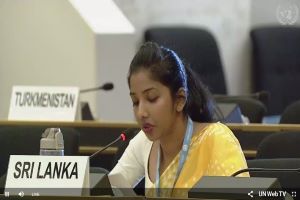

Statement by the Democratic Socialist Republic of Sri Lanka
44th Session of the Human Rights Council
Agenda Item 3: Interactive dialogue with Special Rapporteur on the Right of Everyone to the Enjoyment of the Highest Attainable Standard of Physical and Mental Health
06 July 2020
Madam President,
Sri Lanka welcomes the report presented by the Special Rapporteur on the right of everyone to the enjoyment of the highest attainable standard of physical and mental health. We believe this is timely given that the COVID-19 pandemic is affecting both the physical and mental health of the peoples around the world in an unprecedented manner.
According to WHO statistics, the leading cause of death among young people aged 15-29 has been identified as suicide and most causes are both preventable and treatable. It is distressing that every 40 seconds, someone is dying of suicide somewhere in the world.
It is important to ask what kind of concerns mental health issues cause for humanity and what must be done to address this challenge as we pursue a policy of 'leaving no one behind' in advancing the UN development agenda- 2030, and specially SDG 3 - Good Health and Well-being.
Mental health has become a major public health concern that needs effective and evidence based policy interventions, and it must be tackled in the most comprehensive way possible. However, all stakeholders should harness their efforts as well as means at their disposal to achieve this goal, with States playing the primary role with encouragement and assistance from society. Society's role is crucial in not just ensuring a supportive environment, but more importantly, to break the stigma surrounding mental health issues which prevents adolescents, women and men from opening up about their psychological issues and seeking support when they cannot cope with them.
Sri Lanka has made major achievements in the field of mental health in recent past. The 2005 Mental Health policy has been revised, with the participation of persons affected by mental health disorders, and public comments on the revised draft are being awaited. The current mental health legislation of the country is being revised and amendments are at drafting stage. Sri Lanka has recognized that mental health care and treatment as an integral part of the general health system. Treatment guidelines are in place for managing common mental health disorders including substance abuse, and primary health care providers are being trained using these guidelines. More funds have been allocated for community based rehabilitation and recovery process, including infrastructure.
The Government is exploring possibilities to provide social support and housing for persons affected by mental health disorders. Sri Lanka values the importance of psychosocial support during emergencies, and accordingly, trained healthcare professionals are in operation at district level to be deployed whenever necessary while a disaster preparedness package has been put in place. Mental health has been incorporated to the curriculum of medical and non-medical healthcare providers which is an achievement towards incorporating mental health in the primary healthcare system given that all health workers have an important role to play in recognizing, assessing and supporting people who are at risk.
When Governments formulate strategies and policies on addressing mental health issues, special focus should be projected on young adults considering that half of all mental health conditions in adulthood start by 14 years of age. To achieve this, a comprehensive programme has been launched with the Ministry of Education to promote mental well-being of children. A negative working environment or work-related stress can lead to mental health problems. It is important therefore, for employers and others responsible in the workplace to put in place measures to promote mental health of employees. In this respect, the Government has allocated funds to train at least one person from each institution to address workplace mental wellbeing of workforce and a work place mental health package is in place.
While the Government is in the process of formulating a policy on suicide prevention and has initiated psychological suicide autopsy, it has also made strong policy interventions for suicide prevention such as banning highly lethal pesticides, publishing media guidelines on suicide reporting, mental health promotions in schools, training primary healthcare providers on mental health, programmes on prevention and rehabilitation for alcohol and substance abuse, decriminalization of attempted suicide and operationalization of around the clock helplines by the state and non-state actors.
Madam President,
We believe Mainstream media could play a pivotal role to strengthen suicide prevention via responsible reporting. It can raise awareness, educate the public, create dialogue and reduce stigma surrounding the mental health. Social media campaigns encouraging public to open up on mental health issues and making the public aware on the need of care, empathy and support for those affected could definitely manifest a positive impact on the society.
We would like to learn from the Special Rapporteur on how modern technology could be explored in recognizing people who are at risk of mental health issues.
I thank you.